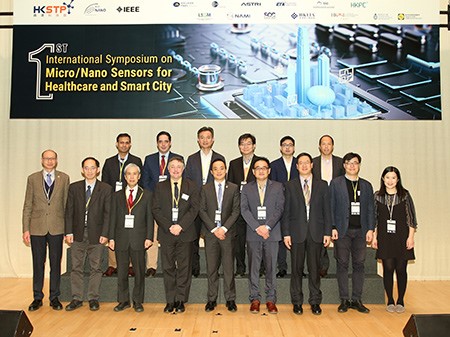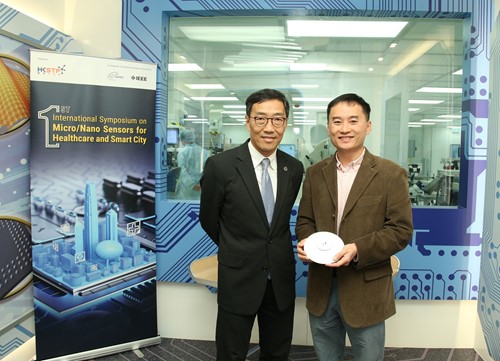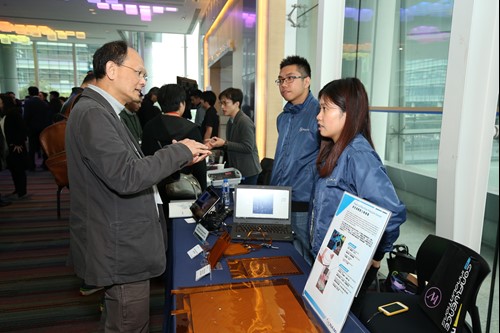HKSTP’s First International Symposium on Sensor Technology for Healthcare and Smart City Brings World Renowned Researchers and Industry Players to Share Expertise in Hong Kong
HKSTP and a Research Centre from HKUST to Collaborate on Onsite Trials of Human Traffic Flow Sensing Technology at Science Park


George Tee, Chief Technology Officer of HKSTP (middle in the front row) and Professor Wen Jung Li, Immediate Past President of IEEE Nanotechnology Council (fourth from the right in the front row) were present at the opening of the First International Symposium on Micro/Nano Sensors for Healthcare and Smart City, together with other honourable guests. The symposium, jointly organised by HKSTP and the IEEE Nanotechnology Council, brought together top researchers and engineers from academia and the industry to share knowledge on emerging sensor technologies.

Albert Wong, Chief Executive Officer of HKSTP (left), and Professor Gary Chan, Director of Entrepreneurship Centre and Professor of the Department of Computer Science and Engineering, HKUST, announced a collaboration to conduct live trials of a new sensor technology to study and manage human traffic flow at Science Park.

Ten HKSTP Park companies and partner organisations demonstrated their technologies and shared their R&D findings on sensor technologies and nanotechnology at the event.
(Hong Kong, 10 December 2018) - Hong Kong Science and Technology Parks Corporation (HKSTP) today announced that the first International Symposium on Micro/Nano Sensors for Healthcare and Smart City, jointly organised with the IEEE Nanotechnology Council, successfully brought together top researchers and engineers from academia and the industry to share knowledge on emerging sensor technologies and their applications in Healthcare and Smart City solutions.
The era of Big Data is leading to a proliferation of small and sophisticated sensors being applied in the areas of robotics, artificial intelligence, Internet of Things (IoT) and electronics, to solve many Smart City challenges. The symposium provided some of the best minds in the various fields of sensor technology the opportunity to share with the larger Innovation & Technology (I&T) community in Hong Kong. These speakers included Professor Wang Zhonglin, Founding Director and Chief Scientist at Beijing Institute of Nanoenergy and Nanosystems, and Hightower Chair in Materials Science and Engineering and Regents' Professor at Georgia Institute of Technology. His research on self-powered nanosystems inspired a worldwide effort in studying energy production for micro-nano-systems. Another speaker was Professor Thomas Kenny, from the Department of Mechanical Engineering at Stanford University. He is currently the world expert on Micro-ElectroMechanical Systems (MEMS) and its applications in IoT and healthcare devices, having authored or co-authored more than 250 papers and holding 50 patents.
In addition, ten HKSTP Park companies and partner organisations demonstrated their technologies and shared their R&D findings on sensor technologies and nanotechnology.
Albert Wong, Chief Executive Officer, HKSTP, said, “The need for sophisticated sensor technology in healthcare and Smart City solutions is driving the development of these miniature sensors all over the world. By 2020, industry observers expect one trillion sensors to be used in various industries, from advanced manufacturing to healthcare. At Science Park, there are about 70 companies involved in the development of sensor and IoT solutions. This is a good signal for us to continue enhancing our infrastructure support for this increasingly significant technology.”
“Our Sensor Hub at Science Park provides an open platform and infrastructure for researchers to test and validate their sensor solutions before going to market. Our working population of 12,000 people also serves as a living laboratory for researchers to collect, analyse and finetune their solutions. We seek more collaborations with academia to help fill the gap between research and industry needs, and aim to bring upstream research at universities to be applied successfully in industries,” he added.
Live Trials of Human Traffic Sensing Technology at Science Park
HKSTP first launched its Sensor Hub programme in September last year, to expedite the R&D of new and emerging sensor technologies and its applications in Smart City solutions. To push the development of sensor technologies further, HKSTP and The Hong Kong University of Science and Technology (HKUST) announced a collaboration to conduct live trials of a sensor technology to study and manage human traffic flow at Science Park.
Fully developed at HKUST under the name SmartAP, the technology senses people distribution, flow and queueing time in a designated area over time, offering the potential to improve service operations in locations such as shopping malls, airports, train stations or bus terminals. In the two-year trial period, sensors would be installed at the Atrium Link, the area beneath and around the Charles K. Kao Auditorium at Science Park to understand the overall statistics and flow of people. The collected data will then be used to enhance crowd control operations. The data will also be published in HKSTP’s Data Studio, to allow other companies to develop other data-driven solutions.
Professor Gary Chan, Director of Entrepreneurship Centre and Professor of the Department of Computer Science and Engineering, HKUST, said, “People sensing technology enables many novel applications for the Retail and Smart City sectors. We look forward to working with HKSTP and demonstrating how our technology improves our lives and makes the Park more efficient in human traffic management.”
HKSTP’s Sensor Hub at Science Park provides a real environment to test and expedite the R&D of emerging sensor technologies and related products and solutions. Arrow Asia Pac Limited was the first strategic partner to collaborate with HKSTP in testing water, air and weather sensor technologies, together with other leading sensor companies such as AMS, Honeywell, Libelium, TE and Vishay. There are currently six Sensor Hub projects running at Science Park.
###
For media enquiries, please contact pr@hkstp.org. Explore our latest news in the PRESS ROOM.

